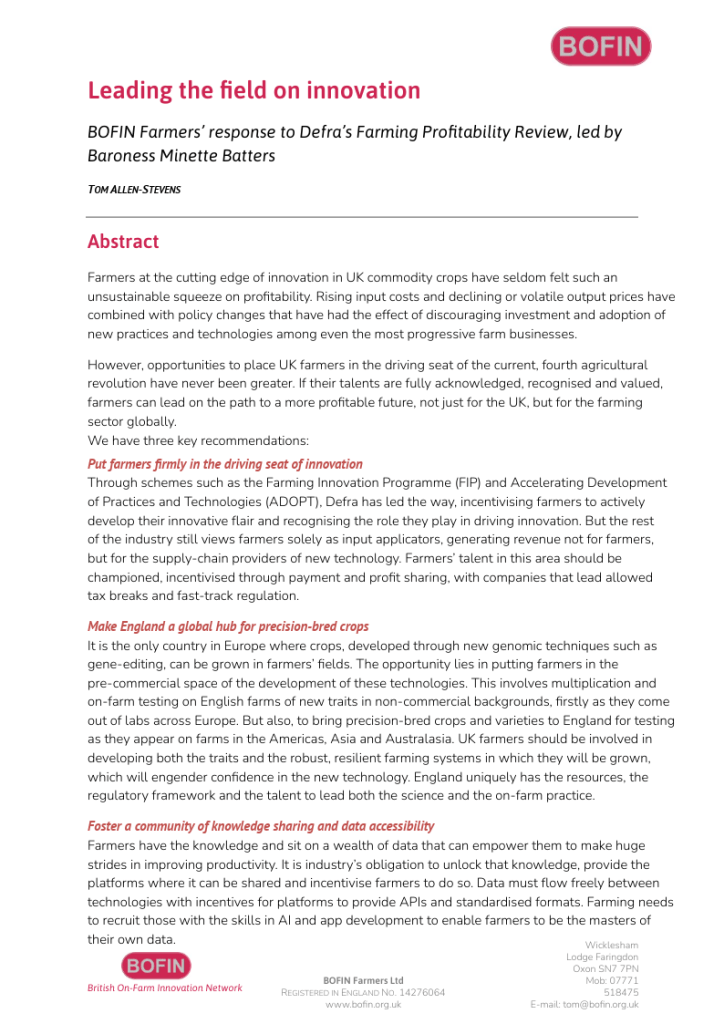
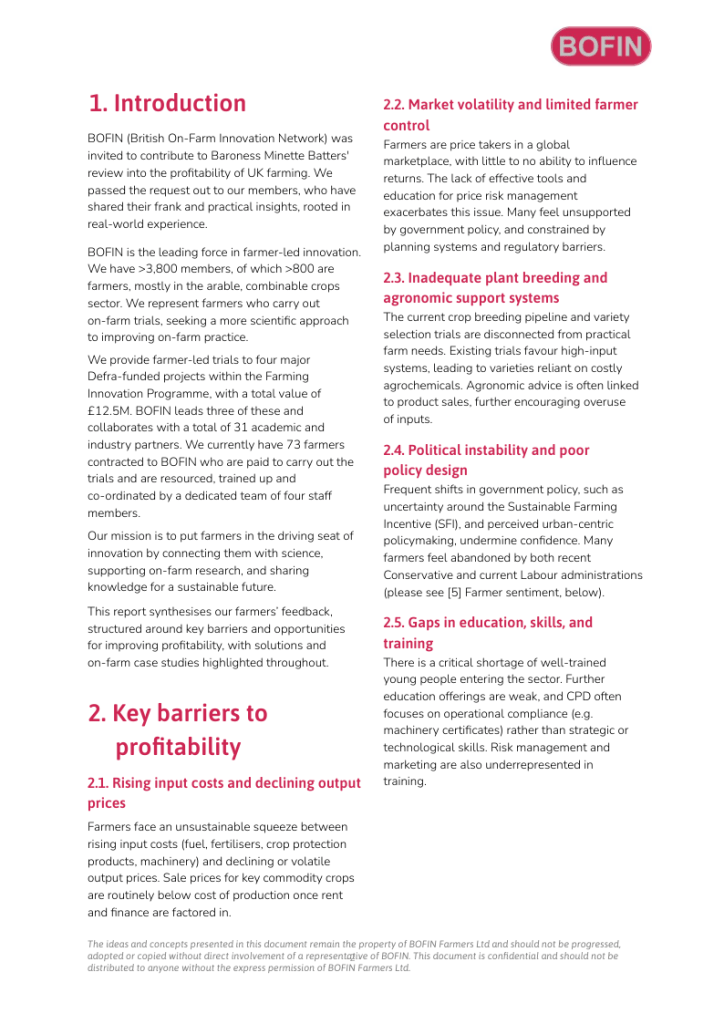
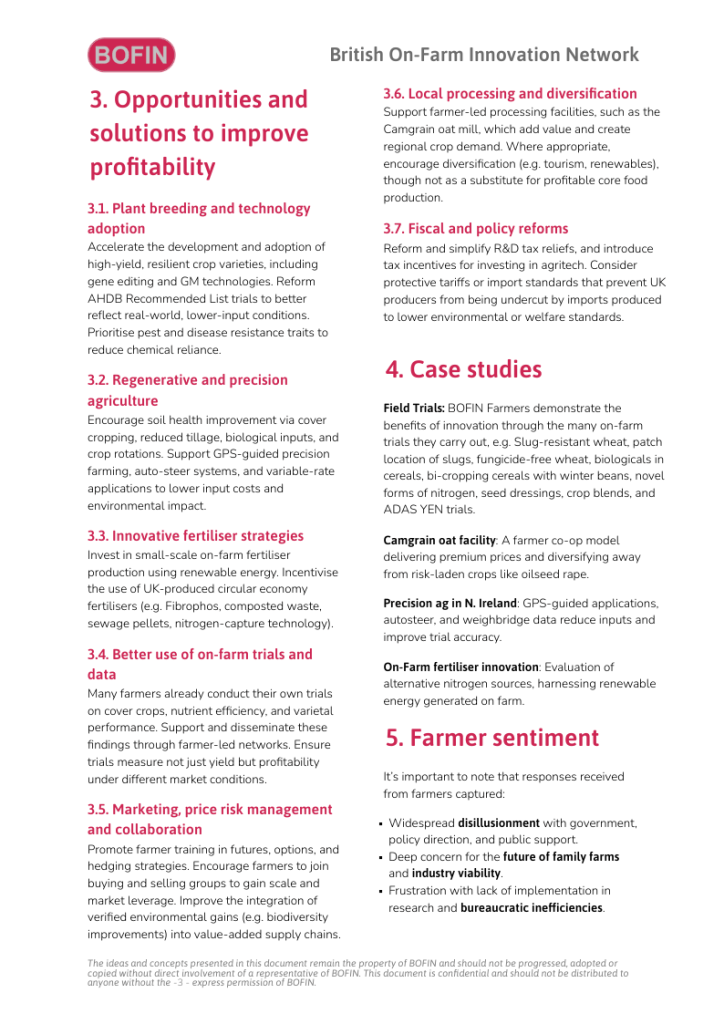
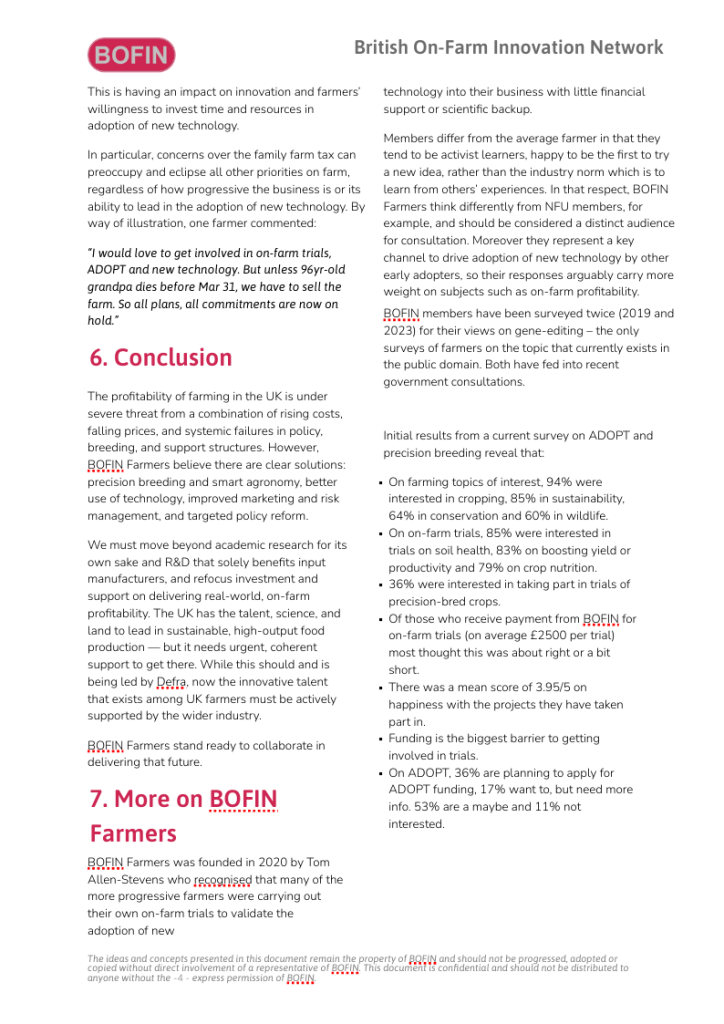




In its latest campaign BOFIN is encouraging farmers to ‘lead the field’ by committing to take part in funded, on-farm trials which give them a hands-on role in shaping the future of UK agriculture while being paid for their contribution.
One of the projects, PROBITY, is bringing precision-bred crops onto farms for the first time in Europe. In 2025-26, this will involve growing varieties produced through TILLING* (Targeting Induced Local Lesions in Genomes) to test traits also being introduced by gene editing.
Two of the three TILLING varieties demonstrate ‘enhanced gravitropism’, resulting in deeper rooting. The project team is particularly interested in hearing from growers in drought-prone areas to test these varieties.
‘PROBITY Pioneer’ trialists need to be committed to the project’s goals and able to demonstrate high standards of practice and professionalism, explains Andrew Newby, who drafted the grower guidelines for the trials.
“There are some important stipulations for our PROBITY Pioneers in order to retain integrity of the trials. This includes a requirement for separate storage for the PROBITY grain and the ability to clean down all farm equipment used in the trial after use,” he said. “We will also need them to be meticulous with their record-keeping and be happy to share their experiences with other farmers.”

Other opportunities include joining the NCS project as a ‘Pulse Pioneer’, which involves running a pulse trial. This is a pea or bean field in which an area is not growing a pulse crop (eg spring oats) that then comes back into the same crop as the rest of the field the following year. An additional product/practice should be trialled across at least two tramlines. Pulse Pioneers are also required to take samples throughout the project, a process managed through ADAS YEN, and to complete an annual carbon footprint through Farm Carbon Toolkit.
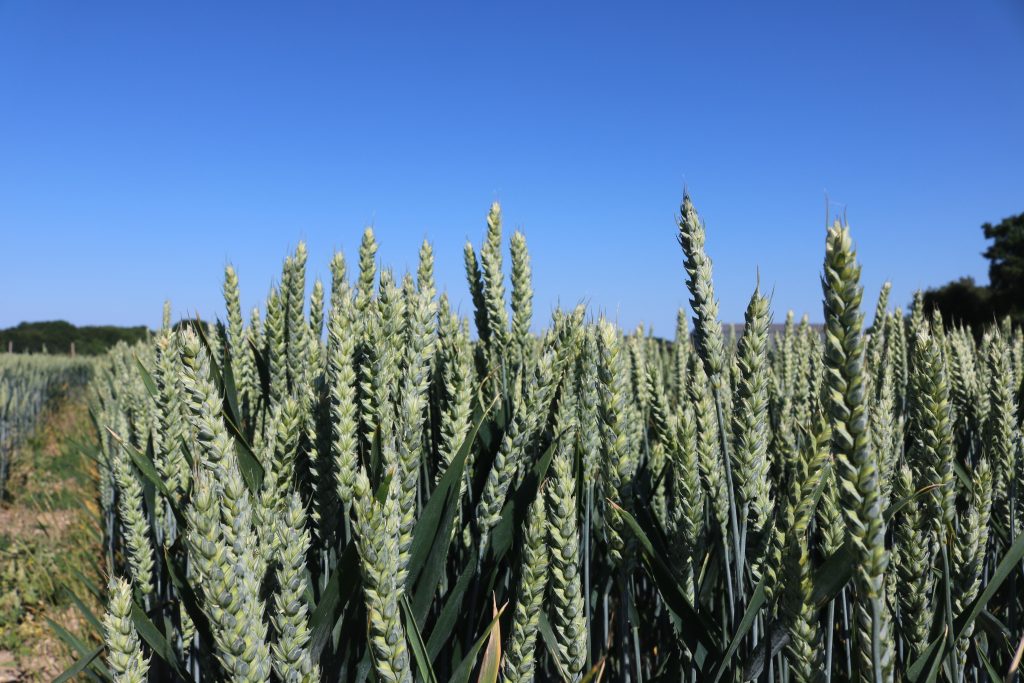
The SLIMERS project is also seeking additional ‘Slug Sleuths’ to join the team for the 2025-26 season. For 2025-6 this will involve patch-treating against the pest this autumn, guided by novel risk-prediction maps.Additionally, BOFIN is interested in hearing from farmers intending to grow spring wheat in 2026 who would like to join the TRUTH project as a ‘Root Ranger’, to explore soil and root health.
Tom Allen-Stevens, Oxfordshire farmer and managing director of BOFIN, says: “The future of farming is being shaped right now. BOFIN trialists have the opportunity to lead the field – taking part in vital research and driving agricultural innovation – while getting paid for their time.
“Our on-farm trials are opening doors for forward-thinking growers to test cutting-edge innovations, influence research, and directly benefit from the results but also from collaboration with leading scientists.
“Anyone interested in finding out more can attend a free webinar at 8.30am on 16th July. In this we will introduce BOFIN and our projects, outline the opportunities available for forward-thinking farmers and hear from some of our experienced trialists.”
For more information visit www.bofin.org.uk/leadthefield
*TILLING (Targeting Induced Local Lesions in Genomes) is a powerful reverse genetics method which has been used since the mid 20th century in plant sciences and allows the introduction of point mutations. Using chemicals or radiation, mutagenesis is randomly introduced throughout the whole genome to bring about new traits, TILLING mutants can then be backcrossed with parental lines to introduce the desired trait. Plants produced under this method are not subject to approval under the legislation passed in 2025, so can be grown without restriction on commercial farms.

Farmers involved in a major slug project are planning to patch-treat against the pest this autumn, guided by novel risk-prediction maps. Working with scientists and innovators, they are gaining ground in their battle against the slimy pests.
SLIMERS – Strategies Leading to Improved Management and Enhanced Resilience against Slugs – is a three-year £2.6M research programme involving more than 100 farms and seven partners.
Funded by Defra’s Farming Innovation Programme, which is delivered by Innovate UK, the project is led by the British On-Farm Innovation Network (BOFIN). It combines expertise from partner organisations the UK Agri-Tech Centre, Harper Adams University, the John Innes Centre, Fotenix, Farmscan Ag and Agrivation. Together they are developing cost-effective forecasting and precision treatment tools, including Al-based autonomous slug monitoring and biological control and exploring ‘slug resistant’ wheat varieties.

Slug patch prediction
Now entering the third and final year of the project, researchers at Harper Adams University believe they have a reliable model to predict slug patch location. Created with data from farmers’ slug monitoring activities over the previous two years of the project, combined with extensive soil mapping and testing, the model predicts areas in their fields with a high likelihood of containing slugs.
The next step is for the team of Slug Sleuth farmer trialists to put the model to the test – using it for selective applications of slug pellets rather than blanket application. The data collected will also be used to further develop the model.
Professor Keith Walters, who leads the work at Harper Adams says: “We’ve known for some time that slugs gather in patches, but prior to SLIMERS we didn’t understand fully the specific factors that cause this and how the patches can be reliably located.
“Thanks to the data collected by the Slug Sleuths we now have that understanding and are using our predictive model to produce detailed risk maps for their fields. In 2025-6 we are asking them to treat only the predicted slug hotspots to fine-tune the models and bring the vision of precision pest management closer to reality.”
AI identification & precision control
The UK Agri-Tech Centre, Fotenix and Farmscan Ag are working on AI identification of slugs, and precision biological control in the form of nematodes.
Fotenix CEO Charles Veys says: “Our role is to build AI-powered slug detection, right there in the field. But first, we’ve got to train the AI, and that means putting slugs in the crosshairs.”
UK Agri-Tech Centre research associate Dr Kerry McDonald-Howard has been training and collecting data on Fotenix’s AI-based multi-spectral imaging cameras in a lab and in the field, before taking to Slug Sleuths’ farms for testing, helping pinpoint the exact spectral signature of the unwelcome visitors. As slugs don’t tend to surface until after dark this has meant heading out in the small hours to collect the training imagery data.

Dr McDonald-Howard says: “By harnessing AI and multi-spectral imaging, we are making significant progress towards in-field detection and identification of slugs. The next phase is to integrate this technology with precision application, enabling targeted biological control with nematodes for greater accuracy and efficiency.
“Through SLIMERS, we are translating advanced research into practical tools that have the potential to transform and future-proof slug management for UK farmers.”
The team at Farmscan Ag are working on a system with the smallest spray width possible which will be added to an existing autonomous farm vehicle.
“We are aiming for 25cm or less, which would mean four nozzles per metre,” explains director Callum Chalmers. “We are running the first trials at the end of 2025, then field trials will be in full swing in early 2026.”
Slug Sleuth
The data on slug activity collected by the 20 Slug Sleuth farmers has proven valuable not just for the project researchers – the farmers have gained from the increased insight too.
Adam Hayward farms at Bishop Burton in East Yorkshire. He says: “I don’t feel like we are ever on top of slugs and I couldn’t see a long-term solution. There must be a better way to control slugs, which is exactly what the project is looking to develop.”
Like the other Slug Sleuths, Adam is paid for his time spent on the project monitoring slug traps weekly and recording data via a smartphone app.
“I soon learned which traps would have the most slugs. I didn’t know where they were before and found there was huge variation within just a few metres and between different days. It’s illustrated to me how spreading pellets across the whole field really isn’t the way to go.”
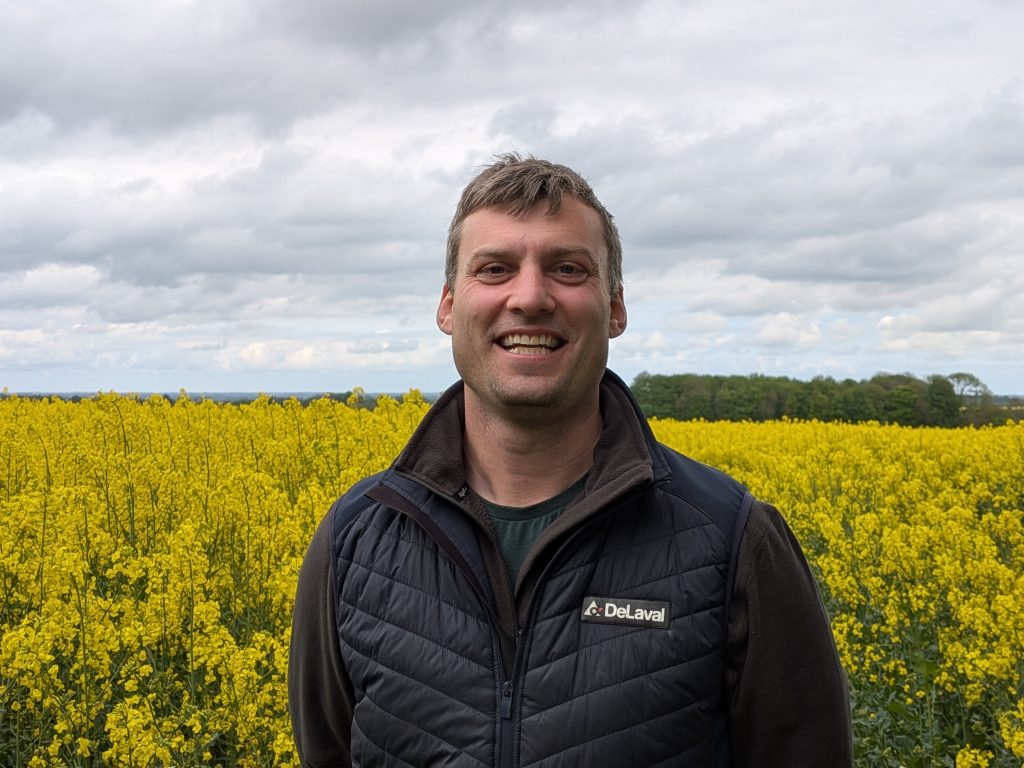
‘Slug resistant’ wheat
The final element of the project is exploring ‘slug resistant’ wheat varieties. Since discovering that several of the Watkins collection of landrace wheats at the John Innes Centre appeared to have slug resistant qualities, Dr Simon Griffiths and his team have been investigating further to identify the genes responsible for the apparent resistance trait and whether it could be introduced to commercial varieties. This work is supported by Dr Victor Soria-Carrasco and his team in the insectary who are continuing feeding trials with slugs on the unusual wheat lines.
In year two of SLIMERS Simon and Victor teamed up with Harper Adams University and six Slug Sleuths to trial a selection of the Watkins varieties crossed with Paragon with additional monitoring to see if indeed these varieties are spurned by slugs.
Tom Allen-Stevens, managing director of the British On-Farm Innovation Network which leads the project says: “What’s remarkable is that we will soon have a service that we can roll out as a tool that all UK farmers will come to rely on to reduce their reliance and expenditure on pellets to control arable farming’s biggest pest. With increasing pressure on chemical control, finding sustainable and environmental solutions has never been more important.”
For more information on SLIMERS visit www.slimers.co.uk


Our panel session on the ‘Seed to Shelf’ main stage (sponsored by KWS) will delve into the potential of gene editing to transform food and farming. We will discuss what precision breeding is, the recent regulatory changes and the BOFIN-led PROBITY project which is bringing precision-bred cereals into trials on commercial farms for the first time in Europe!
The session will run twice over the two days of Cereals – at 1pm on day one and 11am on day two.
Meet the panellists:
Rt Hon George Eustice – Former Secretary of State for Environment, Food and Rural Affairs, George brings a wealth of policy insight and a lifelong interest in farming.
Tom Allen-Stevens – As managing director of the British On-Farm Innovation Network (BOFIN) and an Oxfordshire arable farmer, Tom is at the cutting edge of agricultural innovation. His commitment to collaboration and asking the tough questions guarantees a lively, thought-provoking session.
Andrew Ward MBE – Lincolnshire farmer, Forage Aid founder, and social media star, Andrew is a tireless advocate for British farming. His experience hosting Cereals and engaging with the wider community makes him a familiar and trusted voice.
Dr. Evan Ellison – A postdoctoral researcher at Cambridge, Evan’s expertise in gene editing and crop improvement brings a global perspective and fresh ideas to the panel.
Dr. Emily Harrison – With a background in molecular plant biology and sustainable crop production, Emily’s insights will be invaluable for anyone interested in the science driving agricultural progress.
Whether you’re a farmer, researcher, or agri-business professional, this panel is your chance to hear from experts, ask questions, and consider how precision breeding could shape the future or arable production.
Use BOFIN’s discount code I42K5X for a 50% discount on tickets at www.cerealsevent.co.uk
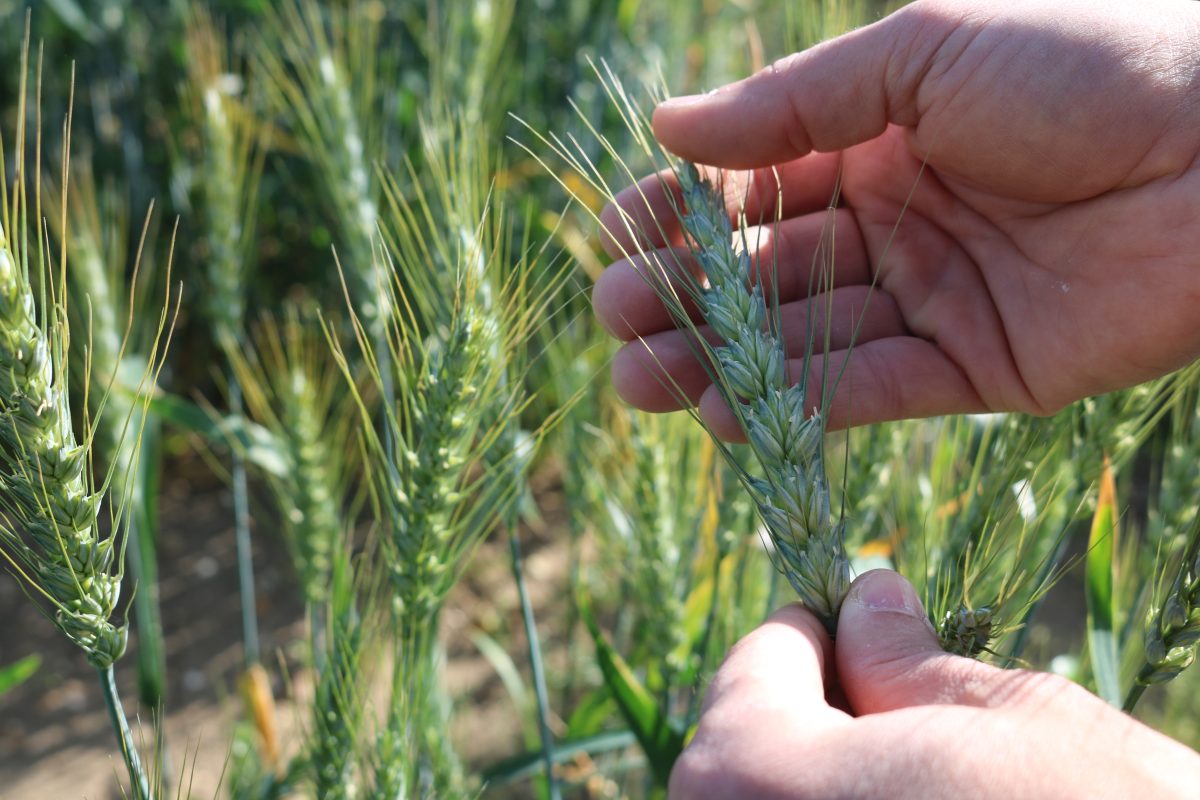
Government agreement over the secondary legislation required to fully implement the Genetic Technology (Precision Breeding) Act 2023 is a watershed moment for agricultural innovation, according to partners in a major agricultural project.
Despite reports of last-minute calls from EU negotiators urging the UK to abandon the legislation, to bring it in line with EU rules, project partners remain confident that plans to conduct the first trials of precision-bred crops on commercial farms will proceed as intended.
With the signing in of secondary legislation in Parliament this week (May 13th), England is set to become the first country in Europe to enable the commercial production and marketing of precision-bred crops. The new regulatory framework, once in force, will allow farmers, scientists, and food manufacturers to harness the benefits of precision breeding using gene-editing techniques to develop crops with traits that could have occurred naturally or through traditional breeding, but achieved more efficiently and with greater precision.
The PROBITY project, led by the British On-Farm Innovation Network (BOFIN) and funded by Defra’s Farming Innovation Programme, brings together a consortium of 12 research institutes, universities, agri-tech companies and farming organisations. Together, they are leading the first farmer-led trials of precision-bred cereal crops on commercial farms across England.
Tom Allen-Stevens, managing director of BOFIN, said: “While the EU remains divided on precision breeding, our government has taken decisive action which will put English farmers and food producers on the front foot. It is a watershed moment for agricultural innovation in this country.
“The new legislation opens the door for us to trial and eventually adopt crop varieties that are more nutritious, resilient, and environmentally sustainable. By moving these innovations from the laboratory to the field, we are paving the way for a more productive and climate-resilient food system.
“We’re excited by the prospect of planting the first pre-commercial precision-bred cereals on English farms in spring 2026, pending PBO approval under the new regulations, and look forward to seeing these new varieties deliver real advantages for productivity and sustainability.”
Professor Nigel Halford of Rothamsted Research and technical lead for PROBITY, said: “It does feel like an historic moment to me, and I expect everyone who has been working on plant biotech while the UK/EU has been marginalised will feel the same. It is tremendously exciting, and I applaud everyone who has worked hard to get the legislation over the line. Most importantly it is a win for science and common sense.
“Whilst there was some concern that the secondary legislation on the Genetic Technologies (Precision Breeding) Act might get caught up in the UK/EU negotiations, the secondary legislation is now law, so any risk has passed. It always seemed unlikely that the UK government would allow the EU to dictate to us on food standards anyway, since that would put the UK in the position of having to comply with regulations it had no control over.”
The PROBITY project is trialling precision-bred cereal varieties including a low acrylamide wheat, a barley designed to reduce livestock methane emissions, and a potentially high-yielding wheat with larger grain size. These trials will not only demonstrate the real-world potential of precision-bred crops, but also ensure transparency and robust scrutiny by involving farmers, scientists, and food manufacturers at every stage.
BOFIN will shortly be recruiting growers to join the project as ‘PROBITY Pioneers’ and be paid to run a trial on their own farm. It will initially involve growing TILLING lines to test traits being introduced by gene editing.
To register interest visit www.bofin.org.uk
All press enquiries for PROBITY should be directed to Clemmie Gleeson clemmie@bofin.org.uk 07485 762841.

ADOPT fund enables farmers to ‘harness innovation’
Farmers are invited to register for a webinar exploring the opportunities created by the Accelerating Development of Practices and Technologies (ADOPT) Fund, which launches on 28th April.
The funding is part of Defra’s Farming Innovation Programme which is delivered by Innovate. It aims to accelerate the adoption of cutting-edge practices, from sustainable techniques to agri-tech solutions by providing grants of up to £100,000. Support grants of £2,500 are also available to kickstart applications.
The British On-Farm Innovation Network (BOFIN) is one of the programme’s approved project facilitators and is ready to encourage farmers to explore the opportunities through a free one-hour webinar on 1st May 2025, starting at 8.30am. It follows the official Innovate UK launch webinar the previous day.
The BOFIN webinar will include a panel discussion chaired by managing director Tom Allen-Stevens. Experts taking part are Kate Pressland of CEIA, Belinda Clarke of Agri-TechE, Becky Swinn of Innovative Farmers, Siwan Howatson of Farming Connect and Holly Shearman of Innovation for Agriculture.
They will discuss the details of the programme, opportunities for farmers, and give advice on how to develop ideas into projects.
“The long-awaited ADOPT Fund puts farmers in the driving seat of innovation, enabling them to harness the new technologies or innovations they believe could bring productivity gains,” said BOFIN’s Tom Allen-Stevens. “We want to make sure all farmers are aware of the opportunities this fund creates, which is why we are hosting this webinar. I encourage anyone interested to register to learn more and start developing their ideas.
“Going forward, our role as facilitators will be firstly to help farmers apply for grants. Then, for those that are successful, to ensure farmers can focus on what matters – running trials that boost productivity and sustainability for their own businesses and the wider industry – while we handle the paperwork, partnerships and project management.”
Register for the webinar at www.tinyurl.com/ADOPTwebinar or for information on working with BOFIN visit www.bofin.org.uk/adopt
Further information:
The ADOPT Fund is part of Defra’s Farming Innovation Programme, with £20.6m allocated. For further information click HERE.
The ADOPT Support Hub is delivered by ADAS, UK Agri-Tech Centre and the Soil Association. Visit FarmPEP for more information.

Join the British On-Farm Innovation Network (BOFIN) for an exclusive webinar on Wednesday 21st May (6.30pm), offering insight from former Defra secretary George Eustice.
In a discussion with BOFIN managing director Tom Allen-Stevens hear George Eustice’s views on the legislation that has challenged and shaped farming including the ban on neonicotinoids and metaldehyde, and why he believes the rules around biopesticides should be changed.
They will also explore the background to the Genetic Technologies Act (2023), why it was prioritised and what government hoped it would enable.
Tom will also raise questions on the Farming Innovation Programme which Mr Eustice put in motion, and his thoughts on the ADOPT programme and how farmers can benefit from the new scheme.
Participants will have the opportunity to put forward their own questions on policy, innovation, and the future of farming.
Register now and join us for an enlightening discussion!

About George Eustice
George Eustice was Secretary of State for Environment, Food and Rural Affairs from 13 February 2020 to 6 September 2022. He was previously Minister of State at the Department for Environment, Food and Rural Affairs (Defra) from 11 May 2015 to 13 February 2020.
He was elected as the Conservative MP for Camborne and Redruth in 2010 and served on the EFRA Select Committee from 2010.
George is from a farming background, and his family still run a fruit farm, restaurant and farm shop in Cornwall where they also have a herd of South Devon cattle and the country’s oldest herd of British Lop pigs.
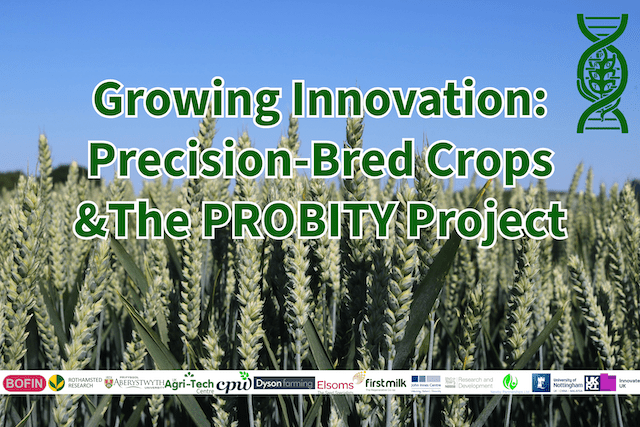
Farmers are invited to attend a free webinar about precision-bred crops, including updates on legislation around the technology, and the opportunity to become one of the first farmers across Europe to grow them.
Organised by partners in the PROBITY project, the online event will take place on Wednesday 16th April from 8.30 to 9.30am via Zoom.
PROBITY – a Platform to Rate Organisms Bred for Improved Traits and Yield – is a three-year, £2.2m farmer-led project, funded by Defra’s Farming Innovation Programme which is delivered by Innovate UK. It is led by the British On-Farm Innovation Network (BOFIN) with 11 partner organisations.
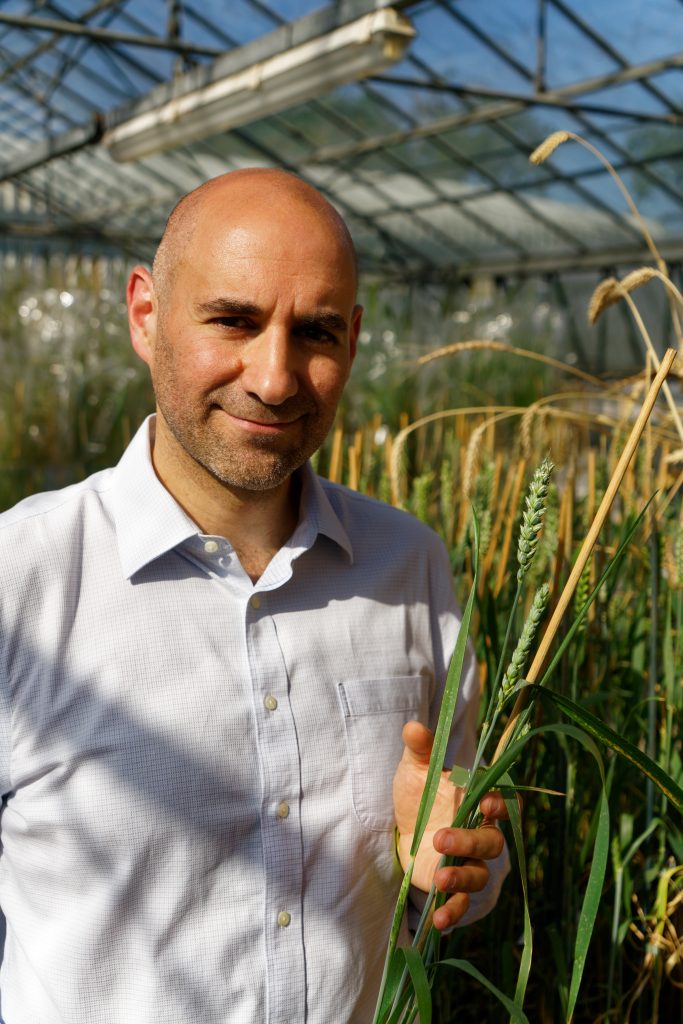
Professor Cristóbal Uauy, Director designate of the John Innes Centre, will outline how scientists use precision breeding techniques such as gene editing to develop innovative crop traits, and the potential benefits this could bring sustainable food and farming.
Professor Nigel Halford of Rothamsted Research, Dr Dylan Phillips of Aberystwyth University and Tom Allen-Stevens of BOFIN will discuss the implications of the Genetic Technology (Precision Breeding) Act and the recently drafted secondary legislation. They will also discuss upcoming opportunities for arable farmers in England to get involved in the PROBITY project.
Finally, Tom Allen-Stevens will be joined by fellow farmer Paul Temple who was involved in the GM field-scale evaluations around 25 years ago. Paul will share his experiences and why he supports the development of precision-bred crops in England.
Tom Allen-Stevens said: “With potential benefits including enhanced nutrient efficiency, better resistance to pests and disease, improved nutrition and reduced environmental impact, it’s essential that we explore this technology further through on-farm trials.
“I encourage all farmers to join our webinar, invest in their knowledge, ask questions and then continue the discussion afterwards via our online Sequence Circle community.”
There are two novel wheat lines currently being multiplied up for seed which will be available to for up to 20 growers to drill this autumn. A precision-bred barley will be available for planting on around five farms in spring 2026.
All farmers are encouraged to take the #PROBITYPledge by spending an hour finding out about precision-bred crops and bringing their views to the Sequence Circle. These are being analysed by University of Nottingham and will feed into recommendations on how precision-bred crops are taken forward in England. Find out more at www.bofin.org.uk/probitypledge
Register for your free place on the webinar at: https://tinyurl.com/precisionbreeding
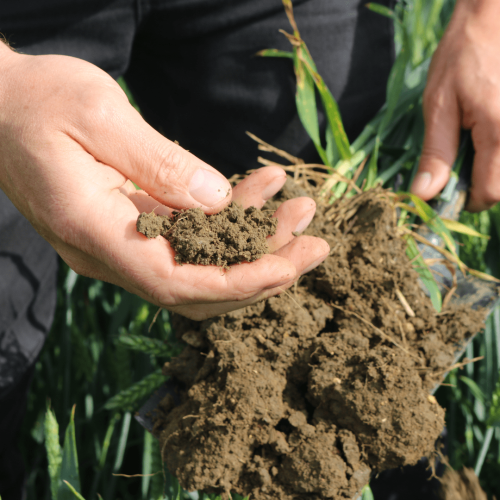
Farmer and scientist collaboration helps to unearth soil secrets
Farmers and scientists working on the TRUTH Project have revealed some intriguing findings from their first year of working together.
TRUTH (Thriving Roots Underpinning Total soil Health) is a three-year £1m project with twin aims of boosting productivity while improving soil health. The project is led by the British On-Farm Innovation Network (BOFIN) with four partners UK Agri-Tech Centre, the John Innes Centre, University of Nottingham and PES Technologies.
Ten ‘Root Ranger’ farmers were paid to carry out on-farm trials in year one (2024), with an additional 10 recruited recently for year two (2025). The Root Rangers’ farms represent varied soil types, across conventional, regenerative and organic systems. They are based across the UK from East Lothian in Scotland to Downpatrick in Northern Ireland and as far south as the Isle of Wight. The farmers each chose a treatment they wanted to assess and have been trained in soil sampling methods.
Microorganism discovery
Dr Tom Thirkell of Crop Science Centre in Cambridge is an expert in mycorrhizal fungi which he has been studying in wheat root samples taken by the Root Rangers. As well as healthy populations of mycorrhiza, Tom’s analysis of the Root Rangers’ samples has also uncovered some “unidentified foreign organisms” (UFOs).
Some of these appear to be bacteria, while others are likely to belong to an ancient but newly-described group of fungi known as Mucoromycotina.
Tom said: “We believe these can also form beneficial interactions with cereal crop roots, but there has been very little study of them compared to the arbuscular mycorrhizas.”
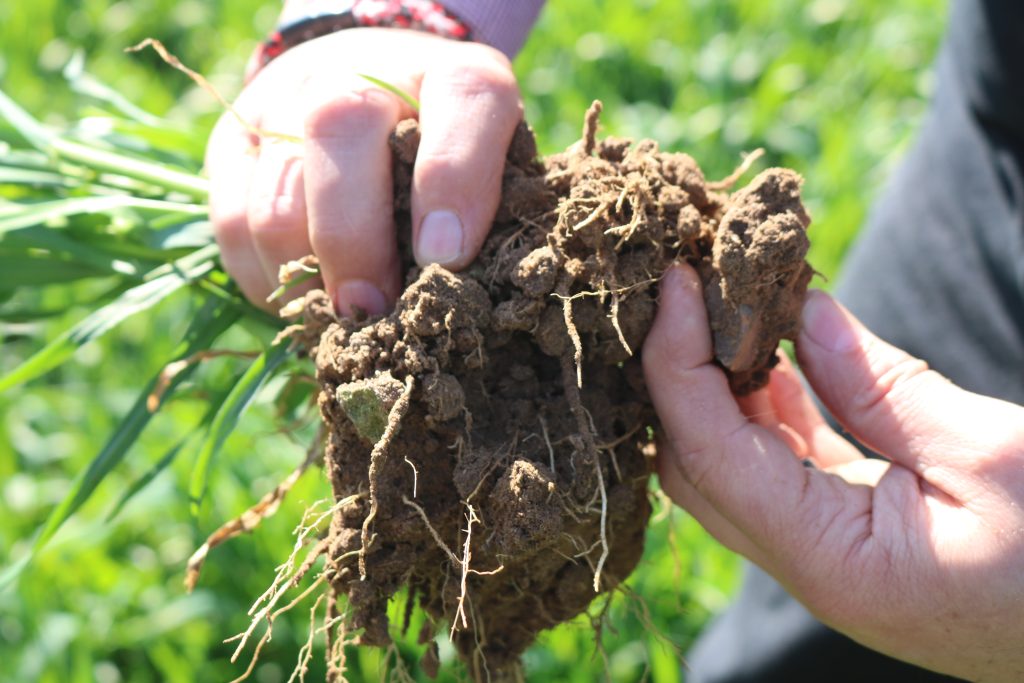
They were found in several samples and are not unique to a specific type of farm. “They are random in how they crop up, but a strength of this project is that we can repeat these tests in years two and three and see if there are any patterns.”
Tom also hopes that DNA sequencing of these samples may be possible in future, so that the ‘UFOs’ can be identified.
His findings from year one suggest that variations in fungal presence are influenced more by individual farms’ management practices, rather than the different treatments being trialled, but repetition of sampling in years two and three will develop this understanding further.
“There is a lot going on underground, but it can be uncovered through collaboration with farmers and other researchers through projects like TRUTH. It’s been well-documented that farm management impacts the soil microbiome. Moving forward, with an increased focus on sustainability and reduced chemical use, it is going to become more important.”
Microbial analysis
Dr Maria Hernandez-Soriano of the John Innes Centre is leading a fascinating investigation into soil microbial diversity. Her work involves analysing DNA from soil samples collected by Root Rangers across 10 farms, revealing a staggering 15,686 individual species.
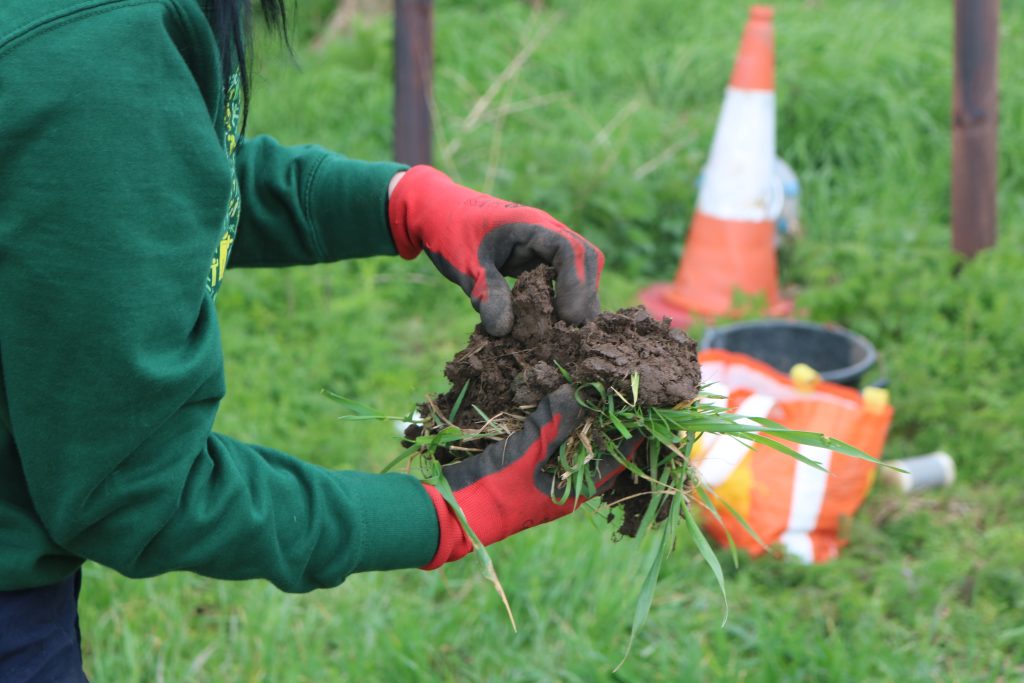
At the John Innes Centre laboratories in Norwich some 222 samples from the Root Rangers were carefully processed to extract the DNA. The DNA was then prepared for sequencing by specialists to ensure the best quality analysis, and finally sent to a leading provider of sequencing services.
The scientists then compiled a ‘library’ of all the DNA found in the samples, naming matched sequences using extensive databases. The result is a vast spreadsheet listing all the individual species found in each sample – a total of 15,686 across the Root Rangers’ soils. From there the data was analysed, drawing comparisons across different systems and the whole dataset, but also drilling down into individual farms’ results to assess and compare diversity.
Maria said: “At the moment the results are suggesting that management is the strongest influence.” In particular, the organic farmers amongst the Root Rangers had the most diverse samples with a significant difference in nitrification too.
Diversity is important because these microbes work together as part of a complex network, both in cooperation with each other and regulating their different roles in soil. “It’s a huge community – some of which we know a lot about while others are yet to be characterised.”
Understanding the activity of nitrification bacteria helps in improving nitrogen use efficiency, Maria added. She has been looking closely at two of the most prevalent nitrifying communities, Nitrososphaera and Nitroscosmicus archaea. These have become the biomarkers in the rhizosphere of modern cultivars following N-fertiliser application, to the detriment of other communities, she explained.
“The abundance of these microbes in soil dramatically increases when you apply ammonium-based fertilisers, rapidly turning ammonium into nitrate, which is highly soluble and easily lost to the environment through leaching or gas emission as nitrous oxide.”
Year two of the project will focus more on the rhizosphere and now with 20 Root Rangers on board the sampling will produce an even stronger dataset.
“Working on the TRUTH project is a dream,” says Maria. “The farmers have been brilliant, and have sent us quality samples meaning that scientists like me can focus on what we do best. Through our work together we can deliver information that is of real value to the farmers.”
A 360 view of soil health
The Root Rangers have also been given a unique view of their soil structure and root systems through X-ray Computed Tomography (CT) scanning.
Dr Craig Sturrock of the University of Nottingham explained that CT scans were used to compare soil ‘cores’ from the different farms. The farmers took samples from their chosen fields of first winter wheat using sections of plastic pipe (15 cm x 8 cm). These were hammered into the ground before being carefully excavated to preserve the structure of the soil and roots inside. Each of the Root Rangers took 10 samples in a typical w-formation, five samples from the treated area under scrutiny in their trials and five from the untreated area.
Craig explained: “It’s been a really exciting first year of the project, using the imaging technology to visualise the structure of soils across the UK, completely non-destructively, which is usually really difficult to see.
“We’ve found some nice differences between the soils. There’s variation between geographical location, soil texture, treatments, and differences in the root structure.”
The research highlighted the impact of management practices, such as ploughing and grazing. The results were not always as expected, with ploughed soil showing minimal differences to min or no-till. This may have been related to the time of sample collection being relatively late in the growth season (May 2024), where the soil has had time to settle after cultivation the previous autumn. “This year we plan to sample in March so tillage differences between sites may be more apparent.”
In year two the Root Rangers will repeat the sampling process, but this time with five soil cores just from untreated areas.
Craig concluded: “I’m really looking forward to year two of the project, seeing how the results will look and what more we can learn from repeating the sampling.”
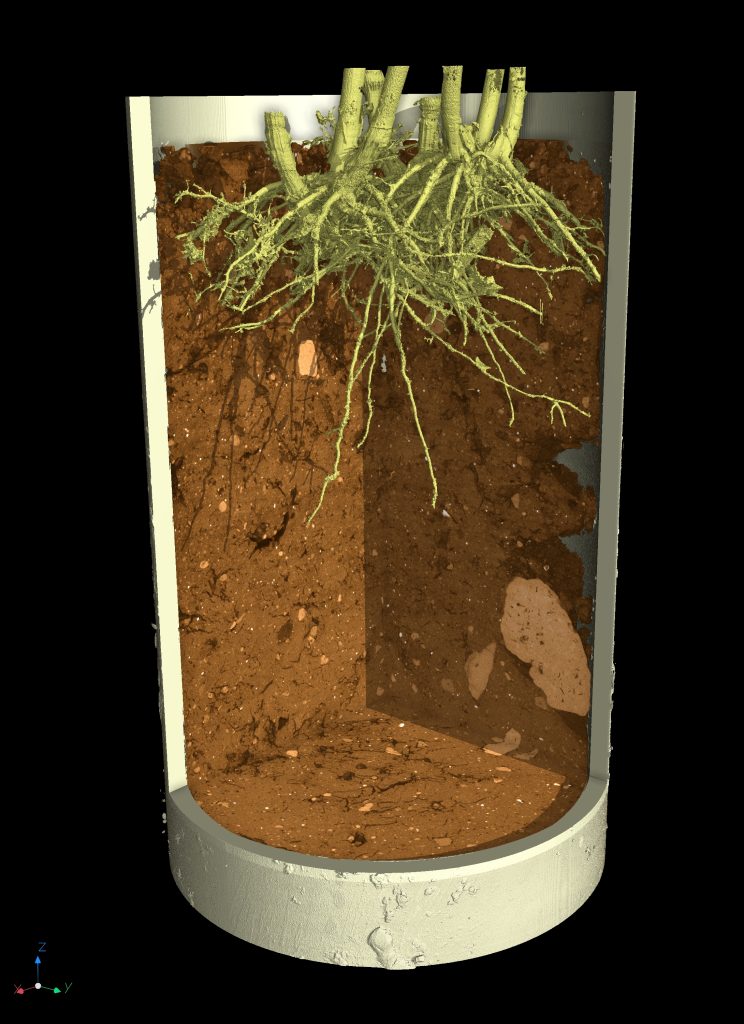
Root Ranger feedback
Anna Pearce is an organic farmer and seed producer from Northumberland. She joined the TRUTH project as she was keen to work with scientists to learn more about the health of the soil on her farm.
She said: “As farmers we don’t often get the opportunity to interact with scientists and this is a huge opportunity to be able to put our heads together.” Anna was particularly interested to find out how her soil compared to other farms and to see the soil core CT scans.
“It is fascinating to see pictures of what is under the ground,” she said. “It was reassuring to learn that my soil copes well with being lightly ploughed and that there is enough life in it to repair any changes to structure.”
Hertfordshire farm manager Ted Allen-Stevens also welcomed the opportunity to take part in the project, particularly as it validated the introduction of regenerative practices on the farm.
He said: “When I saw our results from the TRUTH project I felt that I had some real evidence that soil health had improved since we brought in regenerative practices here.
“It’s only when you drill down into the detail of your own farm that you can get that substance and reassurance of what you’re actually achieving.”
Next steps
The second year of the project will build on the successes so far, with the soil/root testing tools under further scrutiny by the farmers and scientists. An innovative soil health sensor, developed by PES Technologies, will also be circulated amongst the Root Rangers who will put it through their paces. The sensor is designed to measure microbial diversity and fungal:bacterial ratio.
Also, in year two novel wheat varieties are being multiplied ready for trialling on Root Rangers’ farms in the final year of the project. These include a ‘remarkable’ variety that can moderate its own nitrogen supply. Originating from Iran, this particular wheat landrace is part of the historic Watkins collection at JIC.
Maria Hernandez-Soriano explained: “What is interesting about this particular wheat, is that it has demonstrated capacity to decrease the transformation of ammonium into nitrate in the soil. This is believed to be an adaptive trait.”
It means much less nitrogen from fertilisers potentially being lost to the environment and more being taken up and used by the wheat plant itself, because it is controlling the transformation in soil and optimising the uptake.
“We haven’t observed that same capability or trait in any commercial wheat cultivars yet, so that is remarkable.”
Tom Allen-Stevens, managing director of the British On-Farm Innovation Network (BOFIN) which leads the project said: “The quality of samples and resulting data has proven again the value of on-farm trials and what can be gained when farmers and scientists work together.
“There is a huge appetite amongst farmers to learn more about soil health. This project is paving the way for discoveries about how we can improve the long-term productivity of our farms through improved understanding and management of our most precious resource.”
TRUTH is funded by the Farming Futures R&D fund, part of Defra’s Farming Innovation Programme. Defra is working in partnership with Innovate UK, the UK’s innovation agency, who are delivering the programme. TRUTH is led by BOFIN alongside PES Technologies, UK Agri-Tech Centre (which is responsible for project management), John Innes Centre and University of Nottingham.

North Norfolk MP Steff Aquarone highlighted the potential for gene-edited crops to revolutionise farming in a speech to the House of Commons last week.
Speaking in the Inheritance Tax debate on Monday 10th February Mr Aquarone emphasised the importance of local farmers as custodians of the environment and key contributors to the rural economy.

The MP pointed out that North Norfolk’s proximity to the Norwich Research Park makes it an ideal testing ground for advancements in gene editing of crops. He said: “Family farms in Norfolk are the perfect test bed for the latest in gene editing of crops, which can bring about higher yields, smaller carbon footprints and less need for pesticides.”
Mr Aquarone’s speech comes as the UK government progresses secondary legislation to support precision breeding techniques. The PROBITY project, launched in 2024, aims to bring precision-bred cereal varieties onto commercial farms in England for the first time in Europe.
Farmers and other agricultural professionals are encouraged to join the #PROBITYPledge campaign to engage in discussions about precision-bred crops. To take part and learn more visit www.bofin.org.uk/probitypledge